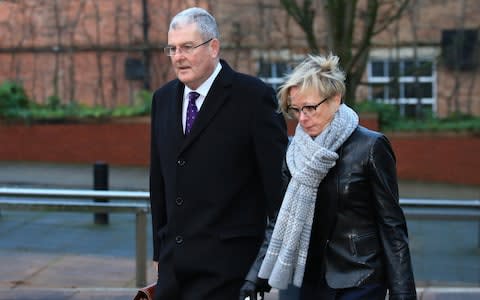Hillsborough police chief says it's 'wrong and unfair' that he is blamed for disaster as tragedy was inevitable

A South Yorkshire police chief believes it is "wrong and unfair" that he is personally taking the blame for the catalogue of failings that led to the Hillsborough disaster, a court heard yesterday.
The tragedy was already an inevitability "by virtue of bad stadium design, bad planning, some aspects of crowd behaviour, some aspects of police behaviour, mistakes by various individuals and genuine human error", according to his defence QC, Ben Myers.
As Duckenfield's version of events for the first time since he was charged with the gross negligence manslaughter of 96 fans, Myers said the prosecution had become "personal" and was unfair.
"This or something like this was going to happen sooner or later," Mr Myers said of the disaster in 1989. Duckenfield, who was brought in as match-day commander just three weeks before the tragedy, should not be judged by 2019 standards of policing at football events, the barrister told Preston Crown Court.
Mr Myers said "in no way" did he seek to insult Liverpool Football Club, its supporters or the city of Liverpool itself, but said Duckenfield was being "held responsible for everything that went wrong that day" and this is "factually unfair".

Duckenfield says he was "not negligent" and "he did his best". Mr Myers added: "We say it is wrong and unfair to single him out like this."
Mr Myers said: "David Duckenfield is not on trial as a representative of police in general or South Yorkshire Police in particular, or emergency services or Sheffield Wednesday... this prosecution is more personal than that."
Duckenfield's legal team, delivering a 30 minute opening speech, went on to describe how "in 1989 the world of fooball was very different from how it is today". "We say to assist you with the evidence let's not try to rewrite history," he said.
"Some of the crowd behaviour would horrify people today and some policing was designed to contain it in a way that you would not see today."
Mr Myers briefly outlined Duckenfield's case after the prosecution opening finished with evidence that one Liverpool fan whose two daughters were crushed by the crowds at Hillsborough, was told by a police officer on the scene to "in no uncertain terms to shut up".
The court heard how Trevor Hicks will describe later in the trial how officers "totally misread" the situation by assuming supporters were trying to stage a pitch invasion instead of escaping the disaster which killed 96 supporters, including a child aged 10.
Jurors were also told how a head of security for the London 2012 Olympics, Douglas Hopkins, is likely to offer critical evidence of the police operation on the day.
The court had earlier been shown distressing images which laid bare how fans were crushed in Hillsborough's Leppings Lane terrace Duckenfield, 74, of Bournemouth, denies the gross negligence manslaughter of 95 of the Liverpool supporters, including 10-year-old Jon-Paul Gilhooley, at the 1989 FA Cup semi-final.
Under the law at the time, there can be no prosecution for the death of the 96th victim, Tony Bland, as he died more than a year and a day after his injuries were caused.
In a case due to last until May, Duckenfield appeared in court alongside former Sheffield Wednesday club secretary Graham Mackrell, 69, of Stocking Pelham, Hertfordshire, who is charged with contravening a term or condition of the stadium's safety certificate and failing to discharge a duty under the Health and Safety Act.

 Yahoo News
Yahoo News 
